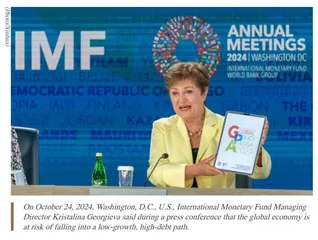Re-globalization: Path out of Plight to Revival for Multilateral Mechanisms
作者: Wang Zhongmei

After the 2008 global financial crisis, the global governance architecture underwent significant changes, accompanied by transformations in political, economic, diplomatic, and social spheres. What we had learnt since the end of World War II was unable to make sense of the evolution and direction of this architecture. Particularly since 2017, economic nationalism has experienced a resurgence driven by the shift in foreign economic and trade policies from liberalism to protectionism in the United States and other developed countries, combined with the impacts of the COVID-19 pandemic and geopolitical conflicts. Competition in industrial policies and technological races have intensified, and the gap between the North and the South has widened. Faced with unprecedented challenges, multilateral mechanisms have come to a historic turning point. On the one hand, globalization encounters headwinds. Market integration and multilateral mechanisms are held back by bloc division and over-securitization. On the other hand, with the expansion of trade and investment, wider participation in globalization and the rise of emerging economies, it may be easier to solve common issues and strengthen the role of multilateral mechanisms.
Deglobalization and Its Impacts
According to a report by the World Economic Forum in 2023, “slowbalization” that began in 2008 may evolve into “deglobalization”. The organization measured trade openness (or trade dependency) of 17 major economies by the ratio of imports and exports to GDP, and used it as an indicator of the degree of globalization. It found that globalization had been on the rise since the end of World War II, reaching “hyper-globalization” between 1990 and 2008. After peaking at nearly 50%, it began to decline slowly, entering the slowbalization phase. Particularly after the COVID-19 pandemic, countries started considering reducing trade dependency especially on any single country. Since 2022, the word “onshoring” has been used in many companies’ (4%) annual reports, compared to less than 1% in the pre-pandemic era. This is an early sign of deglobalization where multinational corporations scale back their global presence due to geopolitical and economic risks.
On the whole, despite some signs, deglobalization is not yet evident. Actually, it is more of a policy shift in many countries than a hard economic reality. Over the past decade or so, we have seen many policies incompatible with hyper-globalization, such as erecting tariff and non-tariff trade barriers, cutting foreign direct investment, localizing supply chains, nearshoring, and tightening regulations. Currently, the United States and many other developed countries in essence champion trade protectionism and economic nationalism, manifested by their unilateral policies and measures to diminish the role of the market in resource allocation. However, even with substantial input and time, it will be unlikely for these policies and measures to reverse the momentum of globalization.
Meanwhile, deglobalization presents paradoxes and distorting effects. Globalization brings more competitors. For most countries, that means stronger competition and greater risks. In recent years, the risks have been amplified by the COVID-19 pandemic, the Ukraine crisis, the Israeli-Palestinian conflict, and the Red Sea crisis, causing panic in many nations. This has partly contributed to deglobalization. However, efforts toward deglobalization may also bring about negative ramifications.
First, deglobalization attempts may reduce productivity at the cost of consumers. If companies restructure their supply chains to source from geographically closer countries rather than more efficient ones, production costs may increase, and consumers will end up paying more. According to the Peterson Institute for International Economics, the new tariff proposals in Donald Trump’s second term would reduce the income of American middle-income households by more than 4.1% or $2,600. Meanwhile, the top 1% would see their income increase due to tax reduction at home. This would only widen the wealth gap in the United States.
Second, deglobalization policies in the name of supply chain security do not necessarily bring economic security. Ideas like supply chain resilience and diversification have been proposed to address concerns over potential supply chain disruptions or breakdowns. When companies face problems like this, they often increase inventory or seek alternative suppliers. However, when state power is used in supply chain restructuring, the impact is far broader and deeper, and there is no solid evidence that nearshoring or onshoring can make supply chains safer or more resilient. On the contrary, restructuring supply chains brings costs and may lead to far lower efficiency. Just think about it. Is single-sourcing or multiple sourcing safer? On the face of it, onshoring may seem more controllable. But it turns multiple sourcing into single sourcing. Therefore, the argument that these policies are for supply chain security simply doesn’t hold up.
Third, deglobalization efforts dampen foreign direct investment with far-reaching impacts. Over the past years, investment restrictions have outweighed and outpaced trade restrictions, with countries like the United States putting restrictions on companies’ ability to invest abroad. According to the Global Trade Alert by the International Monetary Fund, new restrictions on goods, services, and investments in 2022 increased by 14% compared to 2021, reaching over 2,600, more than six times the number in 2013. Investment restrictions saw the largest jump, reaching 239 in 2022, more than four times the number in 2021. Reduction in foreign direct investment may lead to fewer job opportunities, and affect financing of small and medium-sized enterprises. In countries where foreign enterprises contribute significantly to exports, reduced foreign direct investment will also weaken foreign trade.